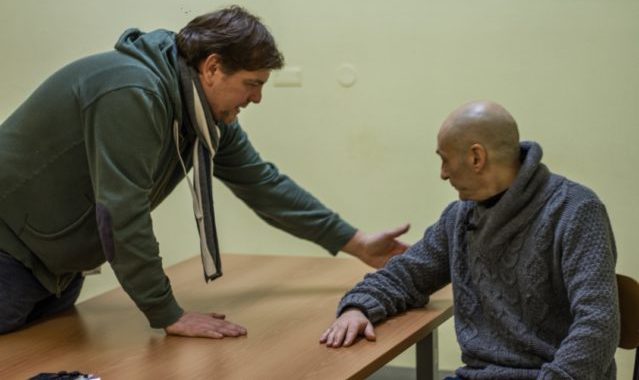The 73rd Venice International Film Festival will be held from August 31 to September 10, 2016. It is directed by Alberto Barbera and organized by the Biennale chaired by Paolo Baratta. The complete lineup was released last week, revealing a strong selection of Italian films that includes restored classics from yesterday, contemporary filmmakers of today and the young independents of tomorrow.
One film in particular has grabbed my attention. In the Special Program selection, you will find a documentary film that takes an in-depth look at a life of incarceration from the perspective of the incarcerated. Director Ambrogio Crespi took his cameras inside the penitentiary of Milan, called the Opera di Milano, and gathered firsthand testimony by interviewing experts and inmates, shedding light on a serious contemporary social issue that is often overlooked.
“Spes Contra Spem, liberi dentro” (Hope Against Hope, Freedom Inside) explores the reasons why people commit crimes and what goes on during their incarceration that will help them to turn their lives around once they are released. The film will not be available to view before it premieres at the Venice Film Festival. However, through research and correspondence with the director, I’ve learned a lot about this topic. I appreciate the way in which Crespi aims to show this perspective, expressed with profound but subtle poetry when describing the minds of the prisoners:
“When you’re alone in your thoughts, the voices in your head become loud. They are paying with their guilt. They have to wait the time of their incarceration. There’s no hope to have hope.”
I spoke with the film’s director Ambrogio Crespi about this unique documentary film. He explained his motive for giving this perspective and what he hopes to accomplish.
Fra Noi: Why did you want to tell this story and give voice to the condemned?
Ambrogio Crespi: It is important that the general public see incarceration from a different point-of-view. Prison should be a place of recovery. Convicted offenders should be rehabilitated and if they decide to embark on the path of change, they should be able to seek help from as many sources as possible without discrimination. We must be their hope.
FN: What went into your research? How did you find the people in your film?
AC: The people who participated in this documentary film are men serving life sentences.
Therefore, they are not actors. The actors appear in the real life flashbacks. They externalize their experience, their pain, their wounds. They are men who do not seek any pardon, but who have acquired the knowledge and understanding of the evil they caused in the first place, which led them to a life behind bars.
These detainees have taken part in the film by the association (against the death penalty) “Hands Off Cain” (Nessuno Tocchi Caino).
Other important presences and relevant participants are: the director of the prison, Giacinto Siciliano; the head of D.A.P Santi Consolo, and the prison guards who work directly everyday with the prisoners.
FN: In making this film, what moved you the most?
AC: The starting point for the film is a conference of the “Spes contra Spem” (Hands Off Cain), which takes place at the penitentiary. The shooting lasted three days and we shot together with Sergio D’Elia (Italian politician, activist and former left-wing terrorist, now a human rights supporter) and Elisabetta Zamparutti (Italian politician affiliated with the Radical Party). I set up a prison cell with three cameras and three lights, creating an atmosphere of spirituality, where inmates were able to externalize the two souls, the white and the black and this was just magnificent. Sergio D’Elia knew how to lead them through this path of liberation.
FN: What is the message you hope to convey?
AC: We tried to bring hope from outside the prison walls to these men serving life sentences, aspiring to make it clear to people who watch the movie, that men can change, if they want. I do not want to convince anyone on my own. Instead, I would like to continue with this project and communicate the thought and message of the association “Hands off Cain” and continue the path traced by Marco Pannella.
FN: Do you think this message will be understood well by an audience as diverse and international as Venezia?
AC: I am convinced, because we carry a message of hope and legality with this film. We used a narrative key against the Mafia and the testimonials give validation.
I hope, as (Giovanni) Falcone said, the film will act as a “big white sheet” upon which we will display the images of our documentary film.
The message of the detainees to young people, especially for those young gangsters or homeboys of the neighborhood, can be really helpful through the drama of their stories. For this reason, I hope that this documentary film will reach these kids. Culture is one of the most powerful means to defeat evil.
Marco Pannella, who has been an important point of reference in my life, always lives by a phrase “Be hope, rather than have hope”. I would like these words to become a starting point to create major changes.
FN: Are there any plans for international distribution?
AC: I would absolutely like to thank IndexWay (IndexProduction) and Hands Off Cain for having produced “Spes Contra Spem, liberi dentro”. Clearly I hope that with the Venice Film Festival, that various possibilities for distribution will arise. I would like to bring this project “outside of the bars”.
If you are able to attend the Venice Film Festival, check the website (http://www.labiennale.org/en/cinema/73rd-festival/line-up/) for the lineup of films along with the dates and times of the screening for “Spes Contra Spem, liberi dentro.” The festival has not yet released the complete screening schedule.
 Fra Noi Embrace Your Inner Italian
Fra Noi Embrace Your Inner Italian







